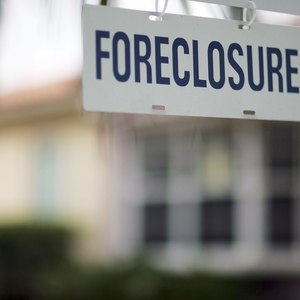
Foreclosures give buyers the chance to purchase homes for below-market-rate prices. According to online foreclosure company RealtyTrac, the average price of a foreclosed residence stood at $167,095 in the first quarter of 2013. That's about 30 percent below the average price of a traditional home during that same period. Buyers don't have to work with real estate agents to purchase one of these usually lower-priced homes, but going it alone could prove more of a challenge.
Types of Foreclosures
There are two main types of foreclosed homes: those now owned by private banks and lenders and those owned by government agencies. When borrowers stop making mortgage payments on loans insured by the government -- such as FHA or VA loans -- agencies such as the U.S. Department of Housing and Urban Development or U.S. Department of Veterans Affairs can take over ownership of their homes through the foreclosure process. When borrowers paying off loans that aren't insured by the government -- known as conventional mortgage loans -- default on their payments, their banks and lenders can take over ownership of their homes through the foreclosure process.
Agent-Only
Buyers who want to purchase foreclosed homes owned by government agencies must work with a real estate agent. Government agencies require real estate agents to make the offers on their foreclosed properties. Private banks and lenders, though, don't care who makes the offer, a buyer or a real estate agent. This means that buyers who don't want to work with real estate agents must focus their attention on these non-government foreclosures.
The Submission Process
Making an offer on a foreclosed home is similar to making one on any other home for sale. The main difference is that you won't be negotiating with an individual owner. Instead, you'll be negotiating with a bank or lender. If you find a foreclosed home you like, call the home's listing agent. Even though a bank or lender is the official owner, you'll still most likely deal with an agent that this lender has hired to market the home and receive offers. This agent can set up a tour of the home. If you still like the home after touring it, you'll have to submit a written offer to the agent. The agent will take this offer to the bank, which will decide to accept it or reject it. If the bank rejects your offer, you might have the opportunity to resubmit a revised offer.
Inspection
If the bank accepts your offer, hire a home inspector to tour the property before taking over ownership of the home. This inspector will look for any serious problems. This is important because most foreclosed homes sold by banks or lenders are sold in "as is" condition, meaning that you'll be responsible for making any necessary repairs. If these repairs are too costly, you might lose any savings you would have gained by purchasing a foreclosed property. If the home inspector finds costly problems with the home you want to buy, you can back out of the sale.
Agents
You might want to work with a real estate agent when searching for foreclosed homes. Many private lenders prefer offers for their foreclosure properties that are made by a licensed real estate agent. Agents can also help you find foreclosed properties you might otherwise have overlooked. The agent's services are free to you: Buyers don't even pay real estate agents. Agents are paid by sellers when a home sale closes.
References
- RealtyTrac: U.S. Foreclosure First Quarter Report
- Bank of America: How to Buy Foreclosed Homes
- Fannie Mae. "HomePath." Accessed May 29, 2020.
- Bank of America. "REO and Bank Owned Homes." Accessed May 29, 2020.
- Foreclosure.com. "Find Foreclosures in Your Area Today." Accessed May 29, 2020.
- RealtyTrac. "Start Your Foreclosure Search Here." Accessed May 29, 2020.
- U.S. Department of Housing and Urban Development. "Homes for Sale." Accessed May 29, 2020.
- Attom Data Solutions. "U.S. Foreclosure Activity Drops to 15-Year Low In 2019." Accessed May 29, 2020.
- U.S. Department of Housing and Urban Development. "203(k) Rehabilitation Mortgage Insurance." Accessed May 29, 2020.
- Fannie Mae. "HomePath Ready Buyer." Accessed May 29, 2020.
- Freddie Mac. "HomeSteps." Accessed May 29, 2020.
- U.S. Department of Housing and Urban Development. "203(K) Rehabilitation Mortgage Insurance: Limited 203(k) Mortgage." Accessed May 29, 2020.
- Fannie Mae. "Financing Opportunities for HomePath Homes." Accessed May 29, 2020.
- Freddie Mac. "HomeSteps: More Questions Answered." Accessed May 29, 2020.
- Freddie Mac. "Freddie Mac Announces Technology Enhancements to Give Lenders a Competitive Edge in Today’s Market." Accessed May 29, 2020.
Writer Bio
Don Rafner has been writing professionally since 1992, with work published in "The Washington Post," "Chicago Tribune," "Phoenix Magazine" and several trade magazines. He is also the managing editor of "Midwest Real Estate News." He specializes in writing about mortgage lending, personal finance, business and real-estate topics. He holds a Bachelor of Arts in journalism from the University of Illinois.

